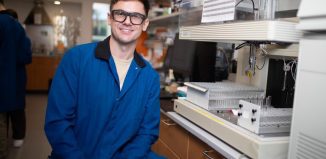Social traits can be nature or nurture
By Elof Carlson
Social traits include ethnic or racial identification, religious beliefs, patriotism and class or family status. We recognize that one can be a sports fan and one’s team may be self-chosen the way my father was a Brooklyn Dodger fan, my brother Roland was a New York Giants fan, and I was a Yankee fan. Fan loyalty can be deeply felt, as watching fans at a game often reveals.
We also recognize that children are usually raised in a religion chosen by their parents, which they may later reject or accept. Ethnic identity is more difficult to assess because immigrants frequently keep a lot of the “old country” values and traditions going in their children. But by the time grandchildren or great-grandchildren are born in the United States the melting pot is the norm.
I used to have students in some of my classes prepare genetic pedigrees of their family from grandparents to grandchildren, including uncles and aunts and cousins. What I learned in these exercises was that some Irish married Italians, some Jews married non-Jews, some Catholics married Protestants, some blacks married whites, and it was rare to see three generations in the United States where all members were of one descent (e.g., all Irish or all Methodists).
The farther back one goes in a family’s genealogy, the more these mixtures occur. This tells me it is not innate to marry one’s own kind. “Birds of a feather may flock together” as a species, but as anyone who has observed dogs will know, any breed of dog can and will breed with other breeds of dogs.
Despite these evidences of cultural mixing and the uncertain religious identification our descendants will have, much of society likes to believe that social traits are inherited. If a family has several generations of physicians, they may believe being a doctor is “bred in the bone” (for those who grew up before World War II) or that it’s in the family DNA (for those who grew up after 1970 when DNA was entering crossword puzzles and rock music — “Hey hey hey hey, it’s DNA that made me that way”).
Most school teachers will experience parents taking credit for their good genes when their children excel in school but the parents may blame the teacher (or the school board) when their children do poorly in their classes. I have never heard a parent say, “It’s my crummy genes that made my child flunk your course.”
The danger of assigning genes to social behavior is that they lead to racist thinking, ethnic stereotyping and beliefs in social class inferiority. The eugenics movement of the first half of the 20th century was filled with these attempts to assign social failure with defective genes (or before the term gene existed to defective protoplasm).
I much prefer evidence based on experimentation or carefully controlled studies. But wishful thinking is easy to do and widely shared, making the world of politics, popular culture and taboo topics seem more real than the science that shatters these illusions.
Elof Axel Carlson is a distinguished teaching professor emeritus in the Department of Biochemistry and Cell Biology at Stony Brook University.






